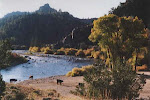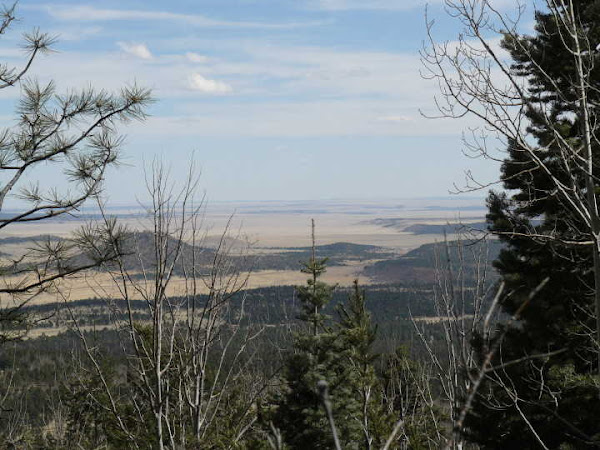Monday, June 15, 2009
"U.S. gas drilling boom stirs water worries"--Reuters
Excerpt: "They have lied to us so much," Grimm told Reuters. He said the company has exceeded the promised number of workers on its drill sites, and flared, or burned, excess gas when it said it wouldn't.
"This was almost a pristine township. They have taken the innocence off it," he said.
Grimm said he has no evidence that drilling is contaminating groundwater, but is aware of concerns that the "fracking" fluid may escape -- either above or below ground -- and that the chemicals in it have the potential to cause cancer, damage human immune and reproductive systems, and trigger other illnesses.
U.S. gas drilling boom stirs water worries
Tue Feb 24, 2009 8:18pm EST
By Jon Hurdle
HICKORY, Penn. (Reuters) - On a snowy hillside in rural southwest Pennsylvania, Larry Grimm drives his truck up a steep gravel track to a hilltop reservoir surrounded by orange plastic fencing and "keep out" signs.
The pond supplies water pumped from a local creek to the natural gas wells that are springing up throughout Mount Pleasant Township, where Grimm is the municipal supervisor.
Range Resources Corp, the Texas company that has drilled 68 wells in the township, needs millions of gallons of water for "hydrofracking," a process that forces a chemical-laden solution deep into the rock, allowing natural gas to be released.
The technique is being repeated at hundreds of other sites in Pennsylvania and parts of surrounding states as energy companies scramble to exploit the Marcellus Shale, one of America's biggest natural gas formations, which some geologists believe contains enough recoverable gas to meet total U.S. needs for a decade or more.
At a time when America is stepping up efforts to reduce its dependence on foreign energy, the Marcellus appears to offer an abundant alternative close to America's biggest natural gas market, the northeast.
But Grimm and others in Hickory say they have already paid a high price for the development of their quiet community from the noise of drills and compressors, heavy truck traffic damaging local roads, and air pollution from flaring or escaping gas.
"This was almost a pristine township. They have taken the innocence off it," he said.
Grimm said he has no evidence that drilling is contaminating groundwater, but is aware of concerns that the "fracking" fluid may escape -- either above or below ground -- and that the chemicals in it have the potential to cause cancer, damage human immune and reproductive systems, and trigger other illnesses.
U.S. gas drilling boom stirs water worries
Tue Feb 24, 2009 8:18pm EST
By Jon Hurdle
HICKORY, Penn. (Reuters) - On a snowy hillside in rural southwest Pennsylvania, Larry Grimm drives his truck up a steep gravel track to a hilltop reservoir surrounded by orange plastic fencing and "keep out" signs.
The pond supplies water pumped from a local creek to the natural gas wells that are springing up throughout Mount Pleasant Township, where Grimm is the municipal supervisor.
Range Resources Corp, the Texas company that has drilled 68 wells in the township, needs millions of gallons of water for "hydrofracking," a process that forces a chemical-laden solution deep into the rock, allowing natural gas to be released.
The technique is being repeated at hundreds of other sites in Pennsylvania and parts of surrounding states as energy companies scramble to exploit the Marcellus Shale, one of America's biggest natural gas formations, which some geologists believe contains enough recoverable gas to meet total U.S. needs for a decade or more.
At a time when America is stepping up efforts to reduce its dependence on foreign energy, the Marcellus appears to offer an abundant alternative close to America's biggest natural gas market, the northeast.
But Grimm and others in Hickory say they have already paid a high price for the development of their quiet community from the noise of drills and compressors, heavy truck traffic damaging local roads, and air pollution from flaring or escaping gas.
"Mora group wants hearing"--OPTIC by David Gulliani
A group concerned about possible oil and gas drilling in Mora County
contends the public has yet to get its say with elected
representatives.
A year ago, the Mora County Commission had planned to hold a public
hearing on the issue, but it canceled the meeting at the last minute.
The nonprofit group, Drilling Mora County, carried on with the event,
with more than 200 attending to listen to arguments about the
drawbacks of energy development.
The commission has yet to hold the public hearing, said Kathleen
Dudley, chairwoman of Drilling Mora County. “We have continued to
ask the commissioners to hold a public hearing, where people can tell
them their views.”
Drilling Mora County was formed after Albuquerque-based KHL Inc.
started looking at leasing mineral rights near Ocaté, northeast of
Mora, a first step to oil and gas drilling.
Dudley said she had been told by the county that it doesn’t have
time for a public hearing, but she said it had time to go to a
KHL-organized trip to Santa Rosa to look at a gas well.
Commissioner Laudente Quintana, who represents Ocaté, said the
commission will hold a public forum before it makes any decision on
oil and gas drilling. So far, no one has filed any applications for
permits for drilling, he said.
The company has contracted with a Santa Fe company to propose
changes to the county’s regulations for development, Quintana said.
“All three commissioners are looking at different angles (of this
issue) about what’s good and what isn’t. We aren’t going to
jeopardize anything for the people,” he said.
Quintana said he’s particularly concerned about the effects of oil
and gas drilling on water supplies.
That’s also an issue of concern for Mora County Drilling. The
group contends that hundreds of water wells across the state have been
contaminated as the result of oil and gas drilling and that the
extraction of natural gas takes upward of 800,000 gallons of a
ranch’s water to begin the drilling process.
The group has started to run weekly advertisements in the Optic,
asking residents to call their commissioners about their views on
energy development. One of its main arguments is that oil and gas
drilling will displace the county’s agricultural way of life.
“What I’d like to see is that any industry that is known to
pollute be prohibited in Mora County, just as the county’s
development guidance standards state right now. It concerns us if an
industry pollutes water or causes health problems,” she said.
“We’re not anti-drilling; we’re anti-pollution and
anti-destruction.”
Whatever the outcome of a public hearing, Dudley said it’s
important to have one.
“Maybe more people want industry to come than don’t. We would
like the commission to hear the voice of the people,” she said.
KHL President Knute H. Lee Jr. didn’t return a message for
comment. He has said before that drilling would benefit the area
economically and that it would be “minimally intrusive.”
Copyright 2009. All rights reserved.
-------------------
contends the public has yet to get its say with elected
representatives.
A year ago, the Mora County Commission had planned to hold a public
hearing on the issue, but it canceled the meeting at the last minute.
The nonprofit group, Drilling Mora County, carried on with the event,
with more than 200 attending to listen to arguments about the
drawbacks of energy development.
The commission has yet to hold the public hearing, said Kathleen
Dudley, chairwoman of Drilling Mora County. “We have continued to
ask the commissioners to hold a public hearing, where people can tell
them their views.”
Drilling Mora County was formed after Albuquerque-based KHL Inc.
started looking at leasing mineral rights near Ocaté, northeast of
Mora, a first step to oil and gas drilling.
Dudley said she had been told by the county that it doesn’t have
time for a public hearing, but she said it had time to go to a
KHL-organized trip to Santa Rosa to look at a gas well.
Commissioner Laudente Quintana, who represents Ocaté, said the
commission will hold a public forum before it makes any decision on
oil and gas drilling. So far, no one has filed any applications for
permits for drilling, he said.
The company has contracted with a Santa Fe company to propose
changes to the county’s regulations for development, Quintana said.
“All three commissioners are looking at different angles (of this
issue) about what’s good and what isn’t. We aren’t going to
jeopardize anything for the people,” he said.
Quintana said he’s particularly concerned about the effects of oil
and gas drilling on water supplies.
That’s also an issue of concern for Mora County Drilling. The
group contends that hundreds of water wells across the state have been
contaminated as the result of oil and gas drilling and that the
extraction of natural gas takes upward of 800,000 gallons of a
ranch’s water to begin the drilling process.
The group has started to run weekly advertisements in the Optic,
asking residents to call their commissioners about their views on
energy development. One of its main arguments is that oil and gas
drilling will displace the county’s agricultural way of life.
“What I’d like to see is that any industry that is known to
pollute be prohibited in Mora County, just as the county’s
development guidance standards state right now. It concerns us if an
industry pollutes water or causes health problems,” she said.
“We’re not anti-drilling; we’re anti-pollution and
anti-destruction.”
Whatever the outcome of a public hearing, Dudley said it’s
important to have one.
“Maybe more people want industry to come than don’t. We would
like the commission to hear the voice of the people,” she said.
KHL President Knute H. Lee Jr. didn’t return a message for
comment. He has said before that drilling would benefit the area
economically and that it would be “minimally intrusive.”
Copyright 2009. All rights reserved.
-------------------
Monday, June 1, 2009
Congress May Close Huge Drilling Industry Loophole that Threatens Clean Drinking Water

Congress May Close Huge Drilling Industry Loophole that Threatens Clean Drinking Water
By Abrahm Lustgarten, ProPublica. Posted May 26, 2009.
Excerpt:
"The drilling process involves injecting millions of gallons of water and sand mixed with tens of thousands of gallons of chemicals -- some that are known to cause cancer -- deep into the ground, where as much as a third of those fluids typically remain after the gas is removed".
Congress is having second thoughts about the environmental dangers posed by the burgeoning gas drilling industry.
Four years after Vice President Dick Cheney spearheaded a massive energy bill that exempted natural gas drilling from federal clean water laws, Congress is having second thoughts about the environmental dangers posed by the burgeoning industry.
With growing evidence that the drilling can damage water supplies, Democratic leaders in Congress are circulating legislation that would repeal the extraordinary exemption and for the first time require companies to disclose all chemicals used in the key drilling process, called hydraulic fracturing.
The proposed legislation has already stirred sharp debate.
Subscribe to:
Posts (Atom)










